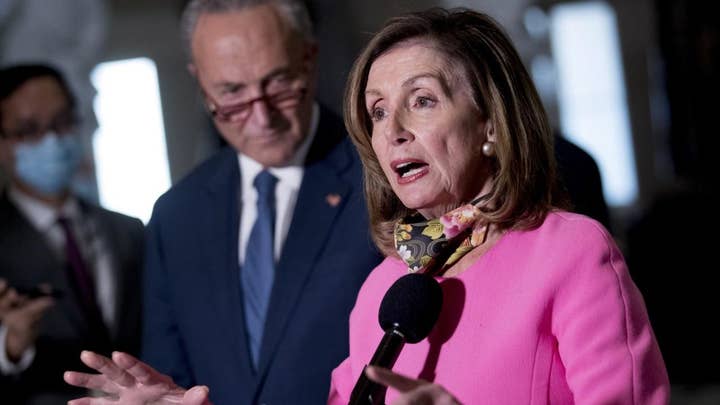Trump calls out Dems for holding COVID relief 'hostage': 'I will act under my authority'
President Trump says he continues to work in 'good faith' to reach an agreement with Democrats that will extend unemployment benefits and provide protection against evictions
President Trump threatened to take coronavirus relief into his own hands “if Democrats continue to hold relief hostage.”
Trump said if coronavirus negotiations continued to stall, he would sign an executive order deferring the payroll tax until the end of the year, starting July 1 retroactively, and extend enhanced unemployment benefits.
He did not state how much those benefits would be -- $600 per week was given in additional federal benefits under the last relief bill but Republicans have proposed cutting that to $200 per week.
The president also said his executive order would defer student loan payments and forgive interest “until further notice.”
Trump said lawyers were drawing up the executive order currently and "it could be by the end of the week" that he signs it. He said, "probably we get sued" but he isn't worried about the legality because "everything gets sued."
Trump earlier in the week first floated the idea of taking executive action to halt evictions and suspend payroll taxes. Trump has long pushed the idea that a payroll tax cut would spur hiring.
KUDLOW BELIEVES TRUMP WILL USE EXECUTIVE ACTION TO FOR CORONAVIRUS RELIEF
In July, the president said he told Republicans they could drop the idea of a cut to the payroll tax, the tax that finances Social Security and Medicare, from the next coronavirus relief bill because Democrats wouldn’t allow it.
“Based on that I told Republicans, I said I think a payroll tax would be good, but we’re not going to get it from Democrats. So you still need Democrat votes. I would like to see it but if we're not going to get their votes, I guess we have to go on to the next thing,” he said.
Lawmakers ended a week of negotiations on coronavirus relief without a deal Friday, or even a clear path forward, amid growing concerns that talks may collapse altogether.
Both parties had a self-imposed Friday deadline. Chief of Staff Mark Meadows said Thursday that if they missed it, there's "no sense" in continuing discussion.
PELOSI SAYS DEMS WILLING TO COMPROMISE AT $2T FOR CORONAVIRUS RELIEF
"I've become extremely doubtful that we’ll be able to make a deal if it goes well beyond Friday," said Meadows.
The impasse in negotiations puts at risk potentially trillions of dollars in aid for families, businesses and the U.S. economy, including a fresh round of $1,200 stimulus checks, extra unemployment aid for millions of unemployed Americans, $100 billion to help reopen schools and relief for cash-strapped state and local governments.
“A lot of people are going to be evicted, but I’m going to stop it because I’ll do it myself if I have to,” Trump told reporters at the White House. “I have a lot of powers with respect to executive orders, and we’re looking at that very seriously right now.”
The House passed its Heroes Act in May, a $3 trillion bill that included a clean extension of the $600 per week federal unemployment benefits, more money for state and local governments and expanded qualification for the stimulus checks, among other Democratic priorities.
The Senate revealed its own HEALS Act, a scaled-down, $1 trillion relief bill that included $200 per week in federal unemployment benefits and $105 billion for schools to assist in reopening.
Whether to extend the supplemental $600 a week in jobless aid has proven to be a key sticking point in negotiations. Democrats have split, some saying the $600 number is a nonstarter and some saying the number is negotiable. Republicans have said $600 is too high and disincentivizes returning to work, as many make more collecting unemployment than they did in wages.
House Speaker Nancy Pelosi said Friday that Democrats were willing to compromise at $2 trillion for the fourth stimulus package, but that the Trump administration had rejected her offer.
Pelosi, D-Calif., said Friday that Democrats have been “mightily trying to find common ground.”
CLICK HERE TO GET THE FOX NEWS APP
“We’ll take it down a trillion, if you add a trillion,” Pelosi said Friday. “They said absolutely not. Then we would be in range.”
Fox Business' Megan Henney contributed to this report.















































